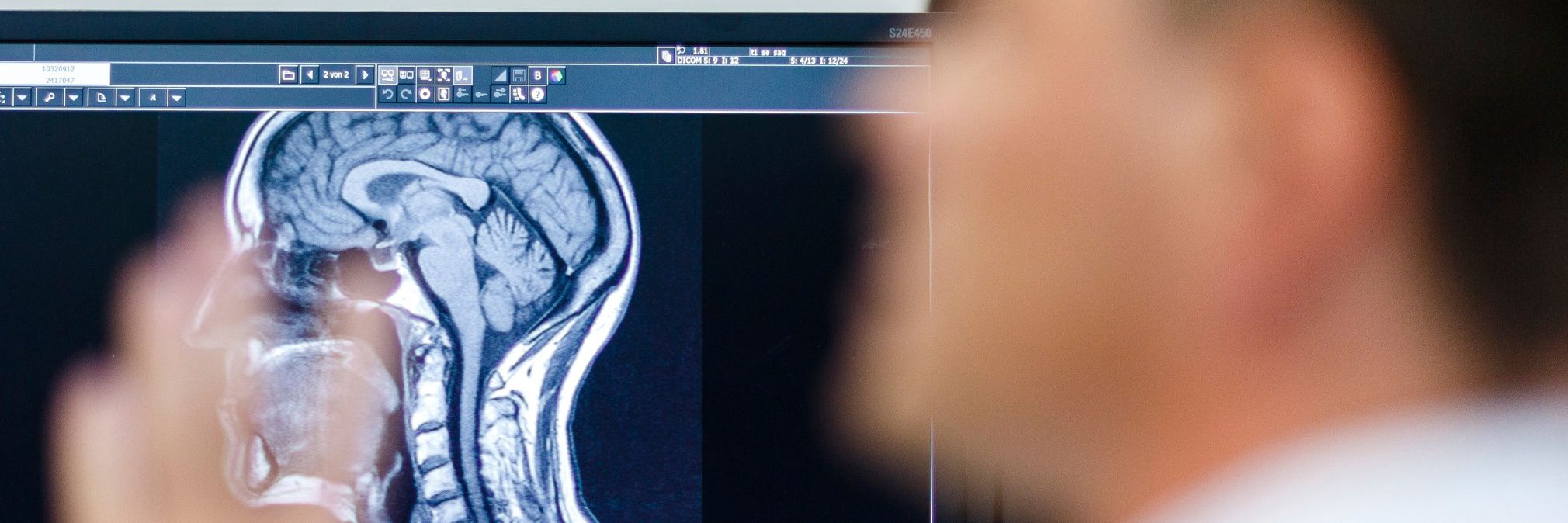Research Projects
Our ongoing research projects cover topics such as stroke imaging, tumor imaging, migraine, aging, neuroimmunology, CT imaging, and Head & Neck imaging. Below we list the most important projects which are currently running at our Department.
Applicant: PD Dr. L. Michels
Support: SNF, No. 182803, 2019 – 2022

Neurofeedback enables patients to regulate their own brain activity. In this project we test if real-time fMRI neurofeedback has long-term effects on attention and visual processing, and if it leads to altered brain function.
More InformationPI: Prof. A. Luft, Prof. S. Wegener
Co-Applicant: Department of Neuroradiology
Supervision: PD Dr. Tilman Schubert
Support: CRPP Stroke, 2019 – 2022

We hypothesize that hypoperfusion in the acute phase of ischemic stroke triggers self healing mechanisms and plasticity in intact brain tissue surrounding the injury. We test this in humans and animal models in a collaborative project with experts from the fields of neurology, neuroradiology, neurosurgery and neuropathology.
PI: Prof. J. Hodler, Prof. M. Guckenberger
Co-Applicant: Department of Neuroradiology
Supervision: Prof. Dr. Andrea Bink
Support: CRPP Tumor, 2019 – 2022

Our clinic is part of an interdisciplinary network aiming to advance artificial intelligence for oncological imaging. We focus on the advanced imaging of brain tumors and aim to improve diagnostic routines and MRI-measures for treatment effects.
More InformationPI: Prof. M. Guckenberger
Co-Applicant: Department of Neuroradiology
Supervision: Prof. Dr. Andrea Bink
Support: SPHN, 2019 – 2022

This project is an initiative to build a Swiss-wide infrastructure for image-based biomarker research and analysis. The goal is to standardize imaging, image analysis and outcome modelling and to evaluate if MR images can serve as prognostic biomarkers in patients with glioblastoma multiforme.
PI: Prof. A. Curt
Co-Applicants: Prof. em. S. Kollias, PD Dr. L. Michels
Support: SNF, No. 169250, 2017 – 2022

Spinal cord injury leads to changes in the processing of sensory information which can also lead to neuropathic pain. We compare individuals with chronic spinal cord injury with and without pain to healthy controls to investigate the effects of deafferentation and pain on the ability to modulate input from the periphery to the brain.
More InformationHead: PD Dr. Sebastian Winklhofer

The CT Imaging Research Group is an interdisciplinary team which focuses on established and novel CT imaging techniques, e.g. low dose applications, Dual-Energy CT, and advanced postprocessing. We aim to implement these methods for the benefit of the patients. Applications include imaging of Head & Neck pathologies, stroke, trauma, and tumors. We closely collaborate with the departments of neurosurgery, neurology, otorhinolaryngology head and neck surgery, and radiology, among others.
Head: PD Dr. Sebastian Winklhofer

The Head and Neck Imaging and Research Group focuses mainly on the orbits, the ears, the nose, the oral cavity, the skull base, the pharynx, and the larynx. Our group is working on various clinical and scientific projects which use established and novel CT and MRI techniques. We closely collaborate with our clinical partners in the fields of ophthalmology, otorhinolaryngology, head and neck surgery, and neurosurgery.
PI: PD Dr. Lars Michels
2017 – 2022

We investigate if neurostimulation has a positive effect on episodic migraine. To this end, we treat migraine patients and healthy controls with real and sham transcranial direct current stimulation (tDCS) and check if symptoms improve over the course of several months.
More InformationPI: PD Dr. Lars Michels
2015 – 2022

In this project we examine healthy elderly people and patients with mild cognitive impairment by multimodal imaging. The latter includes PET imaging, EEG-fMRI, perfusion imaging, MR spectroscopy, and structural imaging. In addition, we obtain genetic profiles for each individual’s Alzheimer’s disease risk.
More InformationPI: Dr. Marco Piccirelli, PD Dr. Lars Michels, Dr. Ghislaine Traber
2015 – 2022

In the course of the project, we developed specific magnetic resonance imaging protocols for a precise and accurate volumetry of the LGN (Aldusary et al., NeuroImage 2019). We now work on further accelerating the data acquisition and processing.
More InformationPI: PD Dr. Zsolt Kulcsar

We conduct and participate in several local and international research projects in the field of neurovascular diseases and therapies.